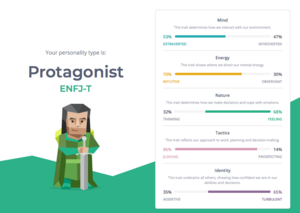maryjane04
Ideal_Rock
- Joined
- Nov 21, 2013
- Messages
- 2,627
I first took the test decades ago as part of a management communications class. The instructor kept the results to herself and then would assign individuals based on their types to different teams/scenarios..most of which seemed straight forward but ended up with wildly different responses.. After each, she explained each grouping and how our actions/responses were to type. It was crazily accurate in how it all played out as the instructor expected.
The course showed how we react, communicate and interpret based on our type. Why we can hear/say/see the same thing and react to/interpret things totally different. And how people can disconnect when you speak/act purely from your lens without taking the time to understand how the preferences of others.
Sorry to ramble - but as I mentioned earlier, I am huge believer. It was one of the few tests/classes that made a profound impact on me as a manager...so much so that for years, I sent many others who reported to me (until it was no longer offered).
Note: I've taken the test as part of other courses and always disappointed that they never demonstrated it's value the way my first class did.
I wanted to share this resource; I found this particular test and site to have lots of quality info if you’re into Myers Briggs.
https://www.16personalities.com
I wanted to share this resource; I found this particular test and site to have lots of quality info if you’re into Myers Briggs.
https://www.16personalities.com

I enjoy these tests. I wonder what *that* says about me lol.
I got ENFJ-T
I am sort of in between extrovert and introvert which is how I would describe myself. I always say I am an extroverted introvert.
But these results are slightly different than the last personality test I took because this one says I am more feeling than thinking but I definitely think and feel (haha) that I am solidly in the middle of both feeling and thinking. So that would explain the variation.

Missy lol I read the difference between the enfj-a and t.. a is for assertive and t is for turbulent

Assertive Protagonist (ENFJ-A) vs. Turbulent Protagonist (ENFJ-T) | 16Personalities
www.16personalities.com
Yes, for sure. This is me.
Turbulent Protagonists’ humility may help them remain more immune to such excesses than their Assertive counterparts.
74% of Turbulent Protagonists say they often – or very often – feel sad, compared to 37% of Assertive Protagonists.
These personalities are also more likely to show an understanding of those in similar plights. This empathy can bring them closer to those who need kindness rather than inspiration.
Either way, there are likely to be more quality exchanges between these Protagonists and the people in their lives.
Turbulent Protagonists empathize more deeply with others who are having trouble dealing with similar things.
Turbulent Protagonists are more likely to ask for an opinion and have more robust exchanges with the people in their lives.
Turbulent Protagonists are likely to be a little more reactive and emotions-based. Identity is about shading shared traits with a different tint within the same fundamental hue. Both Assertive and Turbulent personalities remain kind and inspirational Protagonists – just in their distinctly different ways.
I would agree with the above. I didn't agree with the entire description of the differences between the A vs the T (pertaining to my personality) but I did agree with the above points I highlighted. It's fun taking these tests.

I actually think we have wonderful personalities and wouldn't change a thing!
ESFJ
but I took it almost 10 years ago. I feel like I have changed a lot in the last 10 years, so will retake when I have time.
ESFJ is one of the 16 personality types identified by the Myers-Briggs Type Indicator. People with an ESFJ personality type tend to be outgoing, loyal, organized and tender-hearted. ESFJs gain energy from interacting with other people. They are typically described as outgoing and gregarious.
Your personality type is:
Logician
INTP-t
Yes, for sure. This is me.
Turbulent Protagonists’ humility may help them remain more immune to such excesses than their Assertive counterparts.
74% of Turbulent Protagonists say they often – or very often – feel sad, compared to 37% of Assertive Protagonists.
These personalities are also more likely to show an understanding of those in similar plights. This empathy can bring them closer to those who need kindness rather than inspiration.
Either way, there are likely to be more quality exchanges between these Protagonists and the people in their lives.
Turbulent Protagonists empathize more deeply with others who are having trouble dealing with similar things.
Turbulent Protagonists are more likely to ask for an opinion and have more robust exchanges with the people in their lives.
Turbulent Protagonists are likely to be a little more reactive and emotions-based. Identity is about shading shared traits with a different tint within the same fundamental hue. Both Assertive and Turbulent personalities remain kind and inspirational Protagonists – just in their distinctly different ways.
I would agree with the above. I didn't agree with the entire description of the differences between the A vs the T (pertaining to my personality) but I did agree with the above points I highlighted. It's fun taking these tests.

I feel its fun but that's about it.I like that site because it gives so much info about the personality types in different scenarios — helps give a framework to understand where others might be coming from and seeing things. My SIL suggested it at a family gatherings about two years ago and it was fun. Even if the descriptions weren’t exactly on point everyone found something in theirs that felt like “yes, this is me!” Ah, I miss getting together without the concerns of masks and distancing.
Sounds exactly like the training I took, described in post #30.